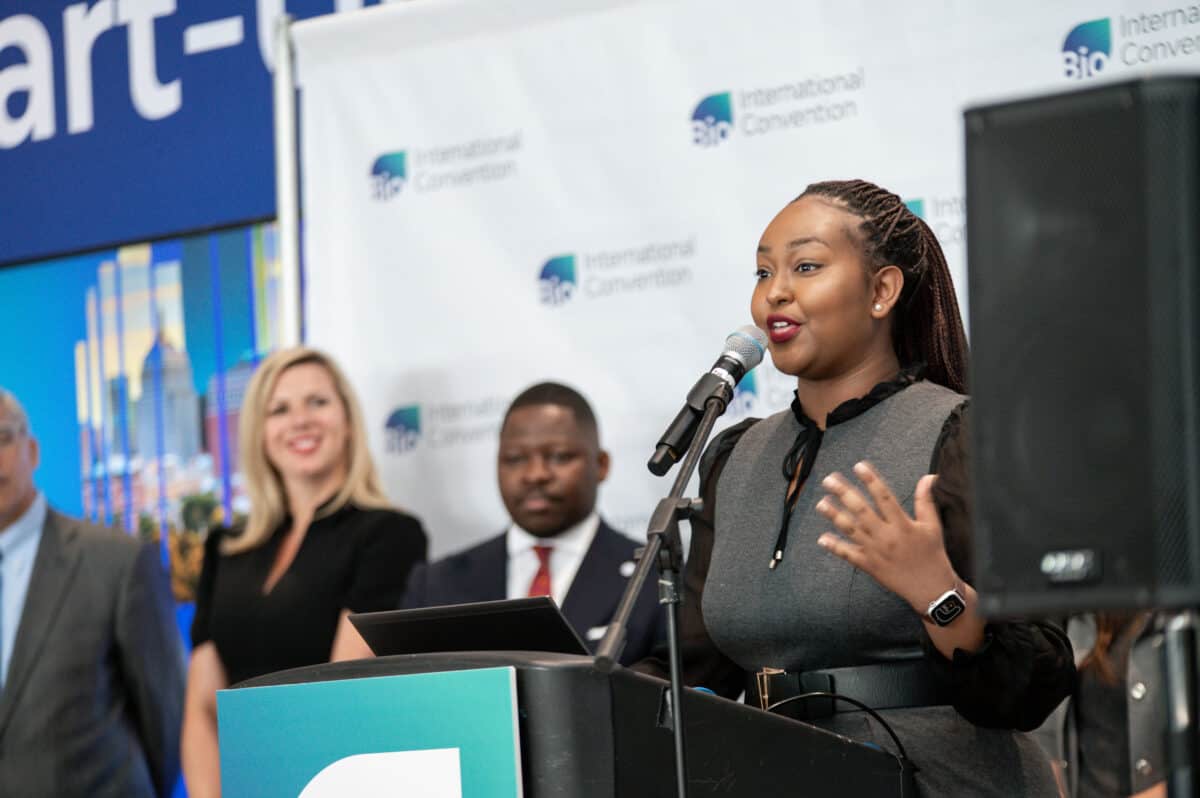
In brief:
- Mayor Wu set a goal of training and hiring 1,000 Boston residents into the life sciences by 2025 and made an initial commitment of $4 million to support it.
- Governor Healey announced plans to reauthorize the Massachusetts Life Sciences Initiative.
- The Healey Administration launched MassTalent to streamline government workforce training resources, and created a new Massachusetts Life Sciences Center program called Pathfinder to fund short-term training programs.
With an audience of more than 20,000 in town for the 2023 BIO International Convention, elected officials took the stage to show the world that Massachusetts and the greater Boston region are prepared to do what is necessary to keep delivering for patients. And that starts with ensuring a robust and diverse talent pipeline.

Before the convention floor even opened its doors at the Boston Convention & Exhibition Center, MassBio CEO & President Kendalle Burlin O’Connell introduced Boston Mayor Michelle Wu at “Start-Up Stadium” as the City delivered some welcome news with resources to back it up.
Flanked by local, state, and industry leaders, Wu announced a new City workforce initiative to train and employ Boston residents in life sciences careers with a goal of adding 1,000 by 2025. Importantly, Wu also announced the availability of $4 million to support that goal.
“As Mayor, my goal is to make Boston the best place in the world to start and grow a life sciences company—to bring even more life-saving innovations and opportunities to life,” said Mayor Michelle Wu.
One of the most inspiring moments during the press conference came from Gaelle Akaliza, a Year Up alum who now works as a Coordinator in Quality Assurance at Vertex. Sharing the stage with Vertex CEO Reshma Kewalramani, who pointed out that her company now has 400+ jobs that don’t required a four-year degree, Akaliza shared how Year Up’s workforce development program not only delivered the technology certifications needed to land the job at Vertex, but also the business and soft skills like communication to be successful.

“I joined Vertex because I wanted to help people,” Akaliza said. “I think that all these programs are here to help young people like me, and I think if we’re providing opportunities, and providing tools and resources to equip young adults like me, we’re creating a better future for all of us.”
The City funding will prioritize training programs that secure internship and hiring commitments from life sciences companies, train for specific in-demand industry positions, and support residents without four-year degrees, including workers of color, women and immigrants, who are underrepresented in the industry today. Another key element of the City’s efforts will be public awareness to help residents see themselves in these careers and understand that they too can be in the life sciences.
With the announcement made, Mayor Wu took the escalator down to the Massachusetts State of Possible Pavilion to cut the ribbon and officially welcome the global biotech community to the City of Boston.
Appearing in front of a video screen big enough for Gillette Stadium or the TD Garden, Massachusetts Governor Maura Healey on Tuesday morning reminded the global biotech community of the public-private partnership that started 15 years ago and pledging to make “a new investment for a new era of success.” That investment is the Massachusetts Life Sciences Initiative (LSI) that super-charged the local industry into the powerhouse it is today.
Speaking to a standing room only crowd at the Massachusetts Pavilion just minutes after her main stage speech, Healey said that her administration will be leaning on industry over the next several months to help her team to draft a “meaningful, kickass reauthorization” that is bolder, bigger, and better.
Beyond the LSI, Healey touted a new one-stop-shop for employers to access workforce pipelines. MassTalent streamlines government resources to allow employers and jobseekers to tap into Massachusetts’ ecosystem, talent, and infrastructure. She specifically called out the $50 million available through the Workforce Competitiveness Trust Fund to fund partnerships between education and training partners and companies to train future workers.

To complement already existing workforce programs, Healey announced Pathmaker—a program funded through the Massachusetts Life Sciences Center to fund training partnerships that result in training programs spanning eight to 10 weeks that are free and “accessible” to students, as well as to adults who received a high school education and have no prior experience.
Speaking on the same stage that the Boston Mayor did just a day before, Healey remarked that Wu’s jobs target is a signal that Massachusetts is “all in” on building a “strong, diverse, skilled workforce” that takes the life sciences industry to “new heights.”
Echoing much of what the governor said on Tuesday, Lt. Governor Kim Driscoll sat down with Sanofi’s Bill Sibold on Wednesday for a fireside chat. She spoke of the importance of supporting the industry today and instituting polices to support it a decade from now. Specifically, Driscoll cited expanding the industry to other parts of the state beyond Cambridge and Boston, growing the biomanufacturing sector, and tackling challenges such as housing.
The talent crunch in the life sciences industry in Massachusetts is no secret. After BIO, neither are the plans from local and state government to tackle the challenge through ongoing partnerships with industry. MassBio is grateful to Mayor Wu, Governor Healey, and their teams for not just talking the talk with a captive international audience, but for setting lofty goals and putting funding behind seeing them through. We are eager to have Bioversity be yet one more example of successful public-private collaboration that will help Massachusetts lengthen its lead in the life sciences.